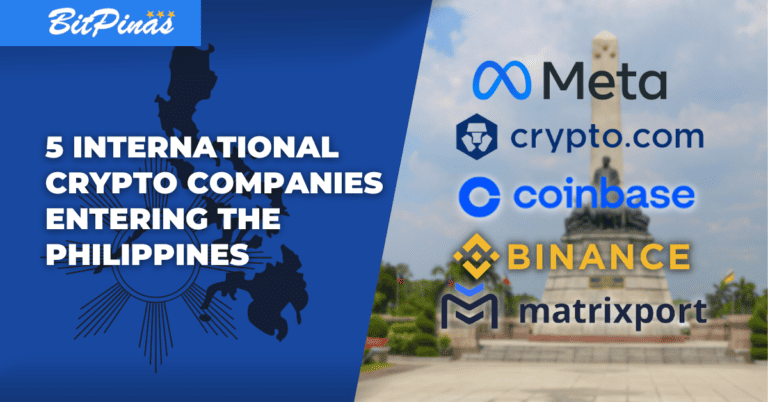[BBB February Recap] Panelists Discuss Pros, Cons, and Risks of AI in Web3 Space
Discover the insights from industry experts as they discuss the pros, cons, and risks of AI in the Web3 space during the Bitcoin, Beer, and Bitstories panel.
![[BBB February Recap] Panelists Discuss Pros, Cons, and Risks of AI in Web3 Space 1 Photo for the Article - [BBB February Recap] Panelists Discuss Pros, Cons, and Risks of AI in Web3 Space](https://bitpinas.com/wp-content/uploads/2023/04/GCash-FutureCast-GChat-GCrypto-GStocks-5-1.png)
- “The Rise of AI: Should Crypto and Web3 Be Concerned?” is the topic of the panel discussion during the Bitcoin, Beer, and Bitstories for February 2023. The panel includes AI and Blockhain enthusiasts Paul Soliman, the CEO of BayaniChain; Michael Calma, the country manager of Advance AI; and Leon Gaban, the founder of Moonholdings.
- As per Soliman, what AI cannot disrupt is the experience of people in the industry and in the human sciences because at the end of the day, happiness is the thing that cannot be replicated, and humans have this scale, this mindset, and this experience.
- While for Calma, NFT artists should maximize the help of AI in producing better artwork and treat it more as a tool than competition.
- However, Gaban admitted that the capabilities of AI in today’s era are not yet fully maximized and that our knowledge regarding the technology is still too narrow.
During the Bitcoin, Beer, and Bitstories’ panel discussion with the theme “The Rise of AI: Should Crypto and Web3 Be Concerned?” on February 23, 2023, AI and Blockhain enthusiasts Paul Soliman, the CEO of BayaniChain; Michael Calma, the country manager of Advance AI; and Leon Gaban, the founder of Moonholdings; talked about the advantages, impact, and help of artificial intelligence (AI) in everyday settings, especially on the non-fungible token (NFT) and crypto industries.
Embracing AI: A Tool Rather Than Competition
“You don’t need to worry because for me, art is very subjective: music, painting, etc. If a person loves your art, that person will go back. Artists should not be worried because art is still subjective and it’s really human nature to have biases. So I do not care if that is AI or human art as long as I love it.”
This was the advice of Paul Soliman to artists in the space, when asked about how AI has become a threat in NFT arts.
“I think I would rather treat it as a tool rather than a competition. It is the same case that you used the help of technology to help you with your brand,” Calma seconded.
According to Soliman, there are already several artists in Likha that are teaming up with AI to produce NFT artworks. Likha is a Filipino-focused NFT marketplace and gallery that is now on its second collection drop.
![[BBB February Recap] Panelists Discuss Pros, Cons, and Risks of AI in Web3 Space 2 Photo for the Article - [BBB February Recap] Panelists Discuss Pros, Cons, and Risks of AI in Web3 Space](https://bitpinas.com/wp-content/uploads/2023/04/photo_2023-02-24_01-33-41-2-768x1024.jpg)
AI’s Impact on Blue-Collar Jobs: A Slow Replacement Process
Talking about human jobs and professions that could be replaced by AI in the future, Calma stressed that it could take a long time for AI to replace blue-collar workers because it is harder to copy jobs and tasks that require physical strength and manual labor.
While for Soliman, what AI cannot disrupt is the experience of people in the industry and in the human sciences because “at the end of the day, happiness is the thing that cannot be replicated, and humans have this scale, this mindset, and this experience that AIs cannot unnest.”
However, Gaban admitted that the capabilities of AI in today’s era are not yet fully maximized and that our knowledge regarding the technology is still too narrow.
![[BBB February Recap] Panelists Discuss Pros, Cons, and Risks of AI in Web3 Space 3 Photo for the Article - [BBB February Recap] Panelists Discuss Pros, Cons, and Risks of AI in Web3 Space](https://bitpinas.com/wp-content/uploads/2023/04/photo_2023-02-24_01-33-42-1024x1024.jpg)
The Human Factor: AI’s Limitations in Replicating Experiences
This is where the Advance AI Country Manager advised that AI should be guarded by humans because the risk of exploitation could still happen:
“We need human intervention to make sure that AI is not a black box. If you let it feed on the data, it could become a beast. Humanity is going to be there because we are unpredictable, while AIs are predictable.”
As defined by Oxford, a “black box” is any complex piece of equipment, typically a unit in an electronic system, with contents that are mysterious to the user.
This idea was supported by Soliman, who shared that AIs can be used to steal information stored on a personal computer, including the seedphrases.
“Just to clarify that AI is not a thinking machine. We’re still using some encryptions that are algorithm-based. When we see blockchain in general, that’s just how encryption works. Since AI is pattern-based, it’s learning from the data it has, so it can be used for encryption,” the Bayanichain CEO explained.
![[BBB February Recap] Panelists Discuss Pros, Cons, and Risks of AI in Web3 Space 4 Photo for the Article - [BBB February Recap] Panelists Discuss Pros, Cons, and Risks of AI in Web3 Space](https://bitpinas.com/wp-content/uploads/2023/04/photo_2023-02-24_01-33-41-768x1024.jpg)
Maximizing AI Potential: Overcoming Narrow Knowledge
With these risks, the three panelists highlighted that humans should not rely merely on AIs, but instead work with the technology to produce a more efficient outcome. As Soliman clarified, “what we’ve seen is that the fourth industrial revolution will be phygital, a merge of cyber/digital and the physical world.”
In a separate panel discussion, ChatGPT, as a panelist, also suggested the same thing, because by “placing too much trust in AI and blockchain, we risk creating a society that’s overly dependent on technology, susceptible to manipulation, and disengaged from ethical considerations.”
“We are the internet capital of the world; we are the texting capital of the world; we are the social media capital of the world. If you want to experiment with whatever product you want and you need users, it’s time to try integrating AI. Learn how to play with this technology,” Soliman concluded.
This article is published on BitPinas: [BBB February Recap] Panelists Discuss Pros, Cons, and Risks of AI in Web3 Space
Disclaimer: BitPinas articles and its external content are not financial advice. The team serves to deliver independent, unbiased news to provide information for Philippine-crypto and beyond.




